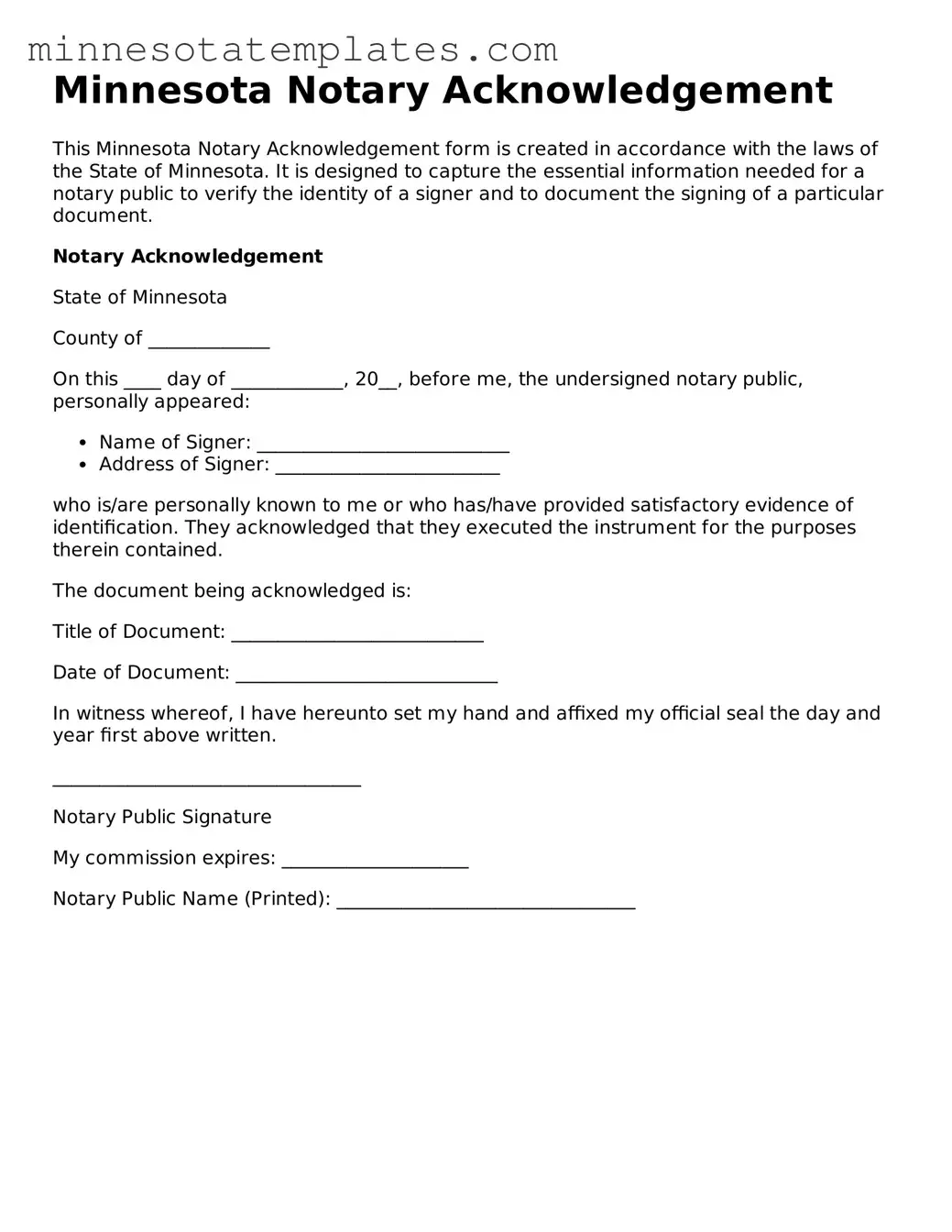Valid Notary Acknowledgement Form for the State of Minnesota
The Minnesota Notary Acknowledgement form plays a crucial role in the legal landscape of the state, serving as a vital tool for verifying the authenticity of signatures on important documents. This form is often used in various transactions, including real estate deals, legal agreements, and financial documents, ensuring that the individuals signing are doing so willingly and with a clear understanding of the implications. It includes essential elements such as the names of the parties involved, the date of the acknowledgment, and the notary's signature and seal, which collectively lend credibility to the document. By providing a framework for notarization, this form helps prevent fraud and misunderstandings, fostering trust in legal transactions. Understanding its components and requirements is essential for anyone engaging in formal agreements in Minnesota, as proper execution of the form can significantly impact the enforceability of the documents involved.
Key takeaways
Filling out and using the Minnesota Notary Acknowledgement form requires attention to detail. Here are some key takeaways to ensure compliance and effectiveness:
- The form must be completed in its entirety to be valid. Incomplete forms may lead to legal challenges.
- Signatures must be made in the presence of a notary public. This step is crucial for the acknowledgment to hold legal weight.
- Always include the date of the acknowledgment. This provides a clear timeline for when the document was notarized.
- Ensure that the notary public's seal and signature are clearly visible. This adds authenticity and credibility to the document.
Misconceptions
Understanding the Minnesota Notary Acknowledgement form is important for anyone who needs to have documents notarized. However, several misconceptions can lead to confusion. Here are five common misconceptions and clarifications for each:
-
Anyone can notarize documents. This is false. Only individuals who have been officially commissioned as notaries public in Minnesota can perform notarizations. They must meet specific requirements and adhere to state laws.
-
A notary can notarize any document. This is not entirely true. Notaries in Minnesota can only notarize documents that they are legally allowed to, which typically includes contracts, affidavits, and other legal documents. Certain documents may require additional certifications.
-
Notarization guarantees the validity of a document. This misconception can lead to misunderstandings. Notarization only confirms the identity of the signer and their willingness to sign. It does not verify the content or legality of the document itself.
-
All notarizations require the signer to be present. While it is generally true that the signer must be present for notarization, there are exceptions in specific circumstances, such as remote online notarization. However, this process has its own set of rules and regulations.
-
Notaries can provide legal advice. This is a common misconception. Notaries are not permitted to give legal advice or interpret the law. Their role is strictly to witness signatures and verify identities.
Being aware of these misconceptions can help ensure a smoother notarization process. Always consult with a qualified professional if you have questions about the notarization process or specific documents.
Other Common Minnesota Templates
Do You Have to Register Your Gun in Minnesota - Can serve as a tax record if applicable in the transaction.
Special Power of Attorney Form - It is important that the agent understands their responsibilities thoroughly before acting.
For individuals navigating vehicle transactions in Alabama, the efficient Motor Vehicle Power of Attorney form process can facilitate the seamless delegation of authority, ensuring that all necessary actions regarding motor vehicles are handled properly and legally.
Transfer Upon Death Deed Minnesota - The form must be signed and notarized to be valid in most states.
